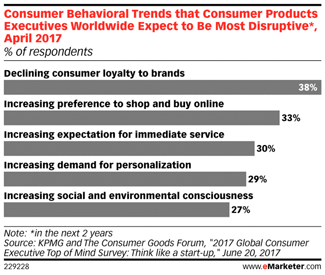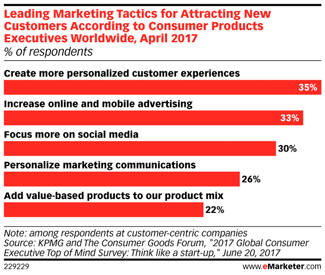Consumer Products Executives Are Worried About Brand Loyalty
August 5, 2017
![]() Do brands still hold sway over consumers? According to new research, executives worldwide are worried that the marketing power of the brand is declining.
Do brands still hold sway over consumers? According to new research, executives worldwide are worried that the marketing power of the brand is declining.
A survey conducted by KPMG and industry network The Consumer Goods Forum in April 2017 found that nearly four in 10 consumer products executives think brand loyalty will see a decline among consumers over the next two years.

But that’s not the only disruption they face. One-third saw consumers’ increasing preference for shopping and buying online as a problem, while three in 10 were worried about a growing expectation for immediate service.
Nearly the same figure, 29%, named an increased demand for personalization as an expected source of disruption in the coming years.
Surprisingly, consumers’ concern for social and environmental matters was also cited by 27% of respondents.
So how do executives plan on responding to these mounting challenges?
For some, customization was the key. More than one-third (35%) of respondents said creating a more personalized customer experience would draw new customers. In addition, 26% expected personalized marketing materials to draw new patrons.

More than ever, marketers are utilizing buyer behavior data, machine learning and artificial intelligence to predict what prospects are likely to do next. This Roundup of articles and interviews will help you understand how practitioners are including a predictive marketing approach in their overall strategy.
The question remains as to whether executives, and their organizations, will be able to incorporate a more bespoke approach into their marketing efforts.
“Although most organizations know that personalization is important, there are a lot of structural impediments that make it hard to do for many companies,” said eMarketer senior analyst Yoram Wurmser.
According to the study, 39% of executives polled admitted their company’s ability to personalize the customer experience fell somewhere between fair and poor.
“The challenge of personalization is that it requires really great integration of customer data across marketing databases and customer relationship management systems,” Wurmser explained. “This enterprise-level integration is still pretty rare, and it’s expensive. And even beyond that, a lot of companies are still organized around channels, which can impede full integration.”
Courtesy of eMarketer




























